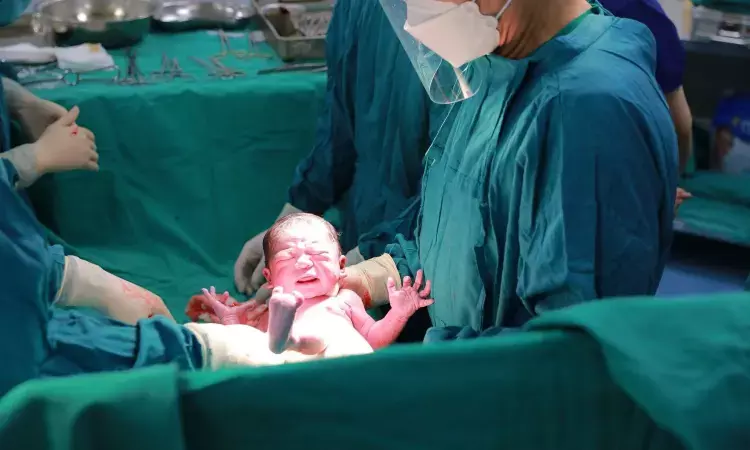- Home
- Medical news & Guidelines
- Anesthesiology
- Cardiology and CTVS
- Critical Care
- Dentistry
- Dermatology
- Diabetes and Endocrinology
- ENT
- Gastroenterology
- Medicine
- Nephrology
- Neurology
- Obstretics-Gynaecology
- Oncology
- Ophthalmology
- Orthopaedics
- Pediatrics-Neonatology
- Psychiatry
- Pulmonology
- Radiology
- Surgery
- Urology
- Laboratory Medicine
- Diet
- Nursing
- Paramedical
- Physiotherapy
- Health news
- Fact Check
- Bone Health Fact Check
- Brain Health Fact Check
- Cancer Related Fact Check
- Child Care Fact Check
- Dental and oral health fact check
- Diabetes and metabolic health fact check
- Diet and Nutrition Fact Check
- Eye and ENT Care Fact Check
- Fitness fact check
- Gut health fact check
- Heart health fact check
- Kidney health fact check
- Medical education fact check
- Men's health fact check
- Respiratory fact check
- Skin and hair care fact check
- Vaccine and Immunization fact check
- Women's health fact check
- AYUSH
- State News
- Andaman and Nicobar Islands
- Andhra Pradesh
- Arunachal Pradesh
- Assam
- Bihar
- Chandigarh
- Chattisgarh
- Dadra and Nagar Haveli
- Daman and Diu
- Delhi
- Goa
- Gujarat
- Haryana
- Himachal Pradesh
- Jammu & Kashmir
- Jharkhand
- Karnataka
- Kerala
- Ladakh
- Lakshadweep
- Madhya Pradesh
- Maharashtra
- Manipur
- Meghalaya
- Mizoram
- Nagaland
- Odisha
- Puducherry
- Punjab
- Rajasthan
- Sikkim
- Tamil Nadu
- Telangana
- Tripura
- Uttar Pradesh
- Uttrakhand
- West Bengal
- Medical Education
- Industry
Early Intratracheal Budesonide Treatment Has Minimal Effect on BPD-Free Survival in Preterm Infants: PLUSS Trial

Australia: In extremely preterm infants treated with surfactant for respiratory distress syndrome, early administration of intratracheal budesonide may have minimal to no impact on survival without bronchopulmonary dysplasia (BPD), PLUSS trial has shown. The findings were published online in the Journal of the American Medical Association (JAMA).
The clinical trial explored whether combining intratracheal budesonide, a steroid, with surfactant therapy can improve outcomes for extremely preterm infants facing respiratory distress syndrome (RDS). The study, known as the PLUSS (Prevention of Lung Injury with Surfactant and Steroid) trial, specifically targeted infants born at 23 to 28 weeks of gestation—one of the most vulnerable groups for developing bronchopulmonary dysplasia, a chronic lung condition that often arises in premature babies due to prolonged ventilation and oxygen therapy.
Bronchopulmonary dysplasia is a frequent and serious complication in extremely preterm infants born at less than 28 weeks gestation. While systemic corticosteroids reduce the risk of BPD, they may carry potential risks of adverse effects. In contrast, administering corticosteroids directly into the lungs could offer a more targeted approach with fewer side effects. With this in mind, Brett J. Manley, Newborn Research, The Royal Women’s Hospital, Melbourne, Victoria, Australia, and colleagues aimed to assess the effectiveness of early intratracheal corticosteroid treatment in improving survival rates free of BPD in extremely preterm infants.
For this purpose, the researchers conducted a double-blind, randomized clinical trial across 21 neonatal units in four countries (Australia, New Zealand, Canada, and Singapore). The study enrolled infants born at less than 28 weeks gestation, aged under 48 hours, and requiring respiratory support, including those treated with surfactant. From January 2018 to March 2023, infants were randomly assigned to receive either intratracheal budesonide mixed with surfactant or surfactant alone.
The primary outcome was survival free of bronchopulmonary dysplasia (BPD) at 36 weeks postmenstrual age, and 15 secondary and safety outcomes were assessed.
The study led to the following findings:
- The primary analysis included 1,059 infants: 524 in the budesonide and surfactant group and 535 in the surfactant-only group.
- The mean gestational age was 25.6 weeks, and the mean birth weight was 775 g; 55.3% of infants were male.
- Survival free of BPD occurred in 25.6% of infants in the budesonide and surfactant group, compared to 22.6% in the surfactant-only group (adjusted risk difference, 2.7%).
- At 36 weeks postmenstrual age, 83.2% of infants in the budesonide and surfactant group and 80.6% in the surfactant-only group were alive.
- Among those alive, 69.3% in the budesonide and surfactant group and 71.9% in the surfactant-only group were diagnosed with BPD.
The findings revealed that in extremely preterm infants with respiratory distress syndrome who received surfactant, early intratracheal budesonide may not significantly affect the chances of surviving without bronchopulmonary dysplasia at 36 weeks postmenstrual age.
"Long-term results from this trial at 2 years, along with findings from similar large studies, will be crucial to better understand the effectiveness and safety of intratracheal budesonide and its potential role in treatment," the researchers concluded.
Reference:
Manley BJ, Kamlin COF, Donath SM, et al. Intratracheal Budesonide Mixed With Surfactant for Extremely Preterm Infants: The PLUSS Randomized Clinical Trial. JAMA. Published online November 11, 2024. doi:10.1001/jama.2024.17380
Dr Kamal Kant Kohli-MBBS, DTCD- a chest specialist with more than 30 years of practice and a flair for writing clinical articles, Dr Kamal Kant Kohli joined Medical Dialogues as a Chief Editor of Medical News. Besides writing articles, as an editor, he proofreads and verifies all the medical content published on Medical Dialogues including those coming from journals, studies,medical conferences,guidelines etc. Email: drkohli@medicaldialogues.in. Contact no. 011-43720751


